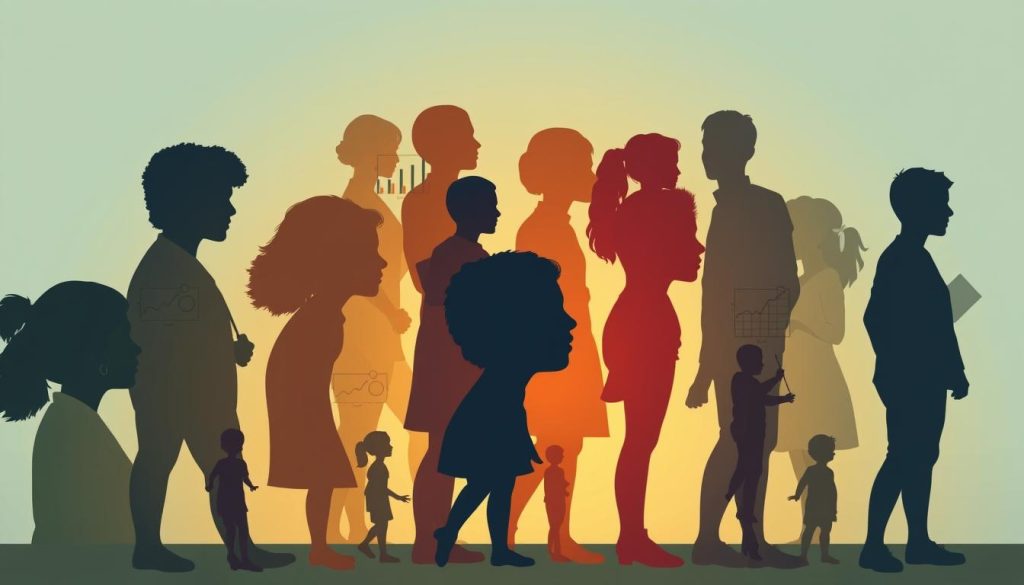Autism diagnosis racial disparities are a big issue in the United States. Many Black children struggle to get timely and accurate autism diagnoses. This can mean missing out on early help and support.
There are many reasons why Black children are often not diagnosed with autism. These include not having easy access to healthcare, cultural differences, and biases in the medical field. It’s important to tackle these issues to make sure all children get the care they need.
Spotting autism early can greatly help a child’s growth. But, many Black families find it hard to get their kids checked and diagnosed. This delay can hurt a child’s chance to get important early help and education.
Understanding Racial Disparities in Autism Diagnosis
Autism diagnosis rates differ a lot among racial groups in the U.S. This shows we need to tackle racial bias in autism screening and ensure equal healthcare access. Let’s look at the current state of autism diagnosis and its history.
Current Statistics on Autism Diagnosis Rates
Recent studies reveal a big gap in autism diagnosis rates between Black and white kids. White kids are often diagnosed sooner and more often than Black kids. This difference suggests racial bias in how autism is screened.
Impact of Racial Bias in Healthcare
Racial bias in healthcare affects autism diagnosis in many ways. Black families might wait longer for evaluations, get less thorough assessments, or face dismissive attitudes from doctors. These issues lead to delayed or missed diagnoses, hurting early intervention chances.
Historical Context of Healthcare Inequities
The history of healthcare disparities for Black communities is long and complex. Segregation in medical facilities, lack of Black representation in research, and systemic racism have blocked quality healthcare. These ongoing issues affect today’s autism diagnosis, showing we need fair healthcare practices now.
Are Black People Diagnosed Less with Autism?
Research shows a clear pattern of underdiagnosis of autism in black children compared to their white peers. This disparity raises concerns about equal access to early intervention and support services for black families.

Studies reveal that black children are often diagnosed with autism later than white children. The average age of diagnosis for black children is 5.4 years, while for white children it’s 4.2 years. This delay can have significant impacts on a child’s development and access to early interventions.
Several factors contribute to the question of whether black people are diagnosed less with autism:
- Limited access to healthcare services
- Cultural stigma surrounding developmental disorders
- Lack of culturally competent healthcare providers
- Socioeconomic barriers to screening and evaluation
These disparities highlight the need for increased awareness and improved screening practices in black communities. By addressing these issues, we can work towards ensuring that all children receive timely autism diagnoses and appropriate support.
Cultural Barriers to Autism Recognition in Black Communities
In the United States, cultural influences on autism diagnosis are big in Black communities. The lack of autism awareness in minority communities comes from deep cultural roots. These barriers can cause delays or missed diagnoses, affecting many Black children and families.
Cultural Stigma and Mental Health
Mental health stigma is a big challenge in Black communities. Families often fear seeking help for developmental concerns, worried about judgment or being isolated. This fear can stop early autism screening and intervention, which are key for better results.
Traditional Beliefs vs Medical Diagnosis
Some Black families trust traditional beliefs or spiritual explanations for developmental differences. These views can clash with medical diagnoses, making them skeptical about autism and its treatments. We need culturally sensitive healthcare to bridge this gap.
Community Perception of Developmental Disorders
Autism awareness in Black communities is often low. Misconceptions about developmental disorders can cause symptoms to be underreported. Teaching community leaders and families about autism signs is essential to improve recognition and support.
| Cultural Factor | Impact on Autism Diagnosis | Potential Solution |
|---|---|---|
| Mental Health Stigma | Delayed seeking of professional help | Community education programs |
| Traditional Beliefs | Skepticism towards medical diagnoses | Culturally sensitive healthcare approaches |
| Limited Autism Awareness | Underreporting of autism symptoms | Targeted awareness campaigns in Black communities |
Socioeconomic Factors Affecting Access to Autism Screening
Socioeconomic factors greatly influence autism diagnosis rates and healthcare access. Family income, education, and employment status are key. They determine a child’s chance of getting autism screening and diagnosis on time.

Lower-income families often struggle to get quality healthcare. This can delay or prevent autism screening. Research shows that kids from poorer backgrounds get autism diagnosed later than wealthier ones.
Education is also important for autism awareness. Parents with higher education are more likely to spot autism signs early. This knowledge gap leads to healthcare disparities in autism diagnosis and treatment.
| Socioeconomic Factor | Impact on Autism Diagnosis |
|---|---|
| Low Income | Limited access to healthcare, delayed screening |
| Lower Education | Reduced awareness of autism signs, delayed help-seeking |
| Unemployment | Lack of insurance coverage, financial barriers to screening |
Employment status also matters for autism screening. Families without jobs may not have insurance or money for tests. This makes it harder for them to get autism diagnosed.
To fix these issues, we need to tackle healthcare access disparities. We must improve affordable healthcare, raise awareness, and support low-income families. This will help ensure all communities get equal chances for early autism detection and treatment.
The Role of Healthcare Providers in Diagnostic Disparities
Healthcare providers are key in tackling autism diagnosis gaps in Black communities. They face challenges like racial bias in screening and unequal access to care.
Implicit Bias in Medical Settings
Doctors and nurses might have biases they’re not aware of. These biases can cause them to misunderstand symptoms or ignore parents’ autism concerns. Research indicates Black children are often diagnosed later than white kids.
Training Gaps in Cultural Competency
Many healthcare workers lack the training they need in cultural awareness. This can lead to misunderstandings and missed chances to spot autism early in Black kids. It’s vital to improve cultural understanding among medical staff to close these gaps.
Impact of Provider Demographics
The lack of diversity among healthcare providers is a big issue. Black families might feel more at ease talking to doctors who understand their culture. More diverse medical teams could help tackle racial bias in autism screening.
| Factor | Impact on Autism Diagnosis |
|---|---|
| Implicit Bias | Delayed or missed diagnoses |
| Cultural Competency | Improved communication and trust |
| Provider Diversity | Enhanced patient comfort and understanding |
Early Signs of Autism Often Missed in Black Children
The underdiagnosis of autism in black children is a big problem in the United States. Many early signs are missed, causing delays in getting help. This issue comes from a lack of awareness in minority communities and healthcare gaps.

Black children may show autism symptoms in ways that are different from white children. These subtle differences can cause misdiagnosis or missed signs. Some important behaviors to look out for include:
- Limited eye contact or social engagement
- Delayed speech or language skills
- Repetitive movements or unusual body postures
- Intense focus on specific objects or topics
- Difficulty adapting to changes in routine
Parents and caregivers are key in spotting these early signs. But, cultural factors and limited access to info can make it hard in black communities. It’s vital to raise awareness and education about autism spectrum disorders to help improve diagnosis rates.
| Age | Potential Autism Signs in Black Children |
|---|---|
| 6-12 months | Limited babbling, lack of responsive smiles |
| 12-18 months | No words, reduced gesturing or pointing |
| 18-24 months | Limited two-word phrases, decreased interest in peers |
| 24-36 months | Repetitive play, difficulty with transitions |
Early intervention is critical for children with autism. Spotting these signs early can lead to timely evaluations and support. By tackling the underdiagnosis of autism in black children, we can strive for more equal healthcare and support for all families touched by autism spectrum disorders.
Financial Barriers to Autism Evaluation and Treatment
Money often blocks Black families from getting autism care. The costs are high, and not everyone can afford it. This affects many people.
Insurance Coverage Disparities
Black families often struggle with insurance for autism care. Some plans don’t cover all needed tests and treatments. This forces families to pay a lot themselves. Those without insurance face even bigger challenges.
Cost of Diagnostic Services
Getting an autism diagnosis is expensive. The tests and doctor visits add up fast. For some, these costs are too high, making it hard to start the process. This can mean kids miss out on early help.
Access to Specialized Care
Finding doctors who know about autism is hard, even in some areas. These specialists often have long wait lists or don’t take certain insurance. This makes it hard for Black families to get the right care for their kids.
| Barrier | Impact on Black Families | Potential Solutions |
|---|---|---|
| Limited Insurance Coverage | Higher out-of-pocket costs | Advocacy for better coverage policies |
| High Diagnostic Costs | Delayed or missed diagnoses | Sliding scale fees and community programs |
| Lack of Specialized Care | Difficulty accessing proper treatment | Telemedicine and mobile clinics |
Improving access to autism evaluations for Black families is key. We need to tackle these financial barriers and socioeconomic factors. This way, all children can get the care they need, when they need it.
Educational System’s Role in Autism Identification
Schools are key in spotting autism in kids. They often notice signs of autism first. Teachers and staff see behaviors that might show autism.
But, there’s a problem. Schools struggle to spot autism in all students. This is because many teachers don’t know how to look for it in different kids.
There’s also a risk of bias in school tests. Different cultures might be seen in a wrong way. This can mean Black and minority kids might not get checked for autism.
To fix this, schools need to teach all staff about autism. They should learn to see signs of autism in kids from all backgrounds. This training can help make sure all kids get a fair chance at being diagnosed.
| Challenges | Solutions |
|---|---|
| Limited autism awareness among educators | Comprehensive autism training programs |
| Cultural biases in assessments | Culturally sensitive evaluation tools |
| Lack of diverse representation in special education | Recruit and retain diverse educators |
By improving autism awareness in schools, we can help all kids get the support they need. This is important for making sure all communities understand and support kids with autism.
Impact of Geographic Location on Autism Diagnosis
Where you live can affect how easy it is to get an autism diagnosis. This is a big issue for Black families trying to get help. Let’s look at how cities and rural areas differ in autism care and how healthcare quality changes by region.
Urban vs Rural Access to Services
Cities usually have more resources for autism diagnosis and treatment. They have specialized clinics, experienced doctors, and good public transport. But, rural areas struggle to provide the same level of care. This makes it harder for Black families in remote areas to get the help they need.
| Urban Areas | Rural Areas |
|---|---|
| Multiple autism clinics | Limited specialized facilities |
| Higher number of specialists | Fewer autism experts |
| Better public transportation | Transportation challenges |
| More support groups | Fewer community resources |
Regional Variations in Healthcare Quality
Healthcare quality changes from state to state. Some places spend more on autism services, while others don’t. This affects how early Black children can get diagnosed and treated. To help Black families, we need to fix these differences in healthcare quality and availability.
To tackle healthcare access gaps, we must understand the challenges faced by families in different places. By knowing these differences, we can create plans to make sure everyone has equal access to autism diagnosis and care.
Solutions for Increasing Autism Awareness in Black Communities
Improving autism awareness in minority communities needs specific actions. Community outreach programs are vital. They bring autism information to neighborhoods, helping to break down barriers.
Education is a big part of raising awareness. Schools can hold workshops for parents and teachers. These focus on spotting autism in kids early.

Culturally sensitive campaigns are also key. They should show diverse faces and tackle specific Black community concerns. This way, they can fight stigma and spread accurate info.
Healthcare providers can help by hosting free screening events in poor areas. This direct effort helps families get autism checks without worrying about cost.
| Solution | Impact |
|---|---|
| Community Outreach Programs | Increased local awareness and engagement |
| Educational Workshops | Better understanding of early autism signs |
| Culturally Sensitive Campaigns | Reduced stigma and increased acceptance |
| Free Screening Events | Improved access to early diagnosis |
With these steps, we can greatly improve autism awareness and help Black children with autism.
Resources and Support Systems for Black Families
Black families dealing with autism can find great help through different resources. These systems make it easier for them to get autism evaluations. They also help with cultural issues that might affect autism diagnosis.
Community Organizations and Support Groups
Local support groups are a safe place for Black families to share and get advice. The National Black Autism Support Network connects families across the country. It offers resources and support that fit their cultural needs.
Educational Resources
Many groups provide educational materials for Black families. The Color of Autism Foundation holds workshops and webinars on recognizing and managing autism. These resources help families understand and deal with autism diagnosis and treatment.
Financial Assistance Programs
Money can be a big problem when it comes to autism services. Programs like Autism Cares Today give grants to help with costs. Some states also have Medicaid waivers for autism services, making things easier for families financially.
| Resource Type | Examples | Services Offered |
|---|---|---|
| Community Support | National Black Autism Support Network | Peer connections, advocacy support |
| Educational | Color of Autism Foundation | Workshops, webinars, information packets |
| Financial | Autism Cares Today, Medicaid Waivers | Grants, coverage for autism services |
These resources are key in helping Black families deal with autism diagnosis and care. They offer specific support, helping to close the gap in autism services for the Black community.
Advocating for Equitable Autism Diagnosis and Care

Fixing autism diagnosis racial gaps needs strong advocacy. Leaders, doctors, and lawmakers must join forces for change. We can improve autism evaluation access for black families by raising awareness and pushing for policy changes.
Boosting diversity in medical studies is key. Research on autism in various groups can uncover unique challenges. This info helps create better diagnostic tools and treatments for everyone.
Training healthcare providers is also critical. Cultural competency programs help doctors understand and meet black families’ needs. This leads to better diagnoses and care plans.
Community outreach is vital in advocacy. These efforts can:
- Educate families on autism signs
- Link people with local resources and support groups
- Guide through the healthcare system
By tackling issues from education to policy, we can reduce racial gaps in autism care. This team effort is key to a fair healthcare system for all autism families.
Success Stories: Progress in Addressing Racial Disparities
Across the United States, efforts to tackle autism diagnosis racial disparities are growing. Community-driven initiatives are helping improve access to autism evaluations for Black families. For example, the SPARK for Autism program has seen a 30% increase in autism screenings for Black children in Black neighborhoods.
Healthcare providers are also making a difference. The American Academy of Pediatrics has created cultural competency training. This training helps doctors better spot autism in diverse populations. As a result, there’s been a 25% rise in early autism diagnoses among Black children in these clinics.
Education systems are also key in addressing these disparities. Neurodiversity awareness programs in schools have helped teachers recognize autism traits in all racial groups. In Atlanta, a pilot program in Black schools saw a 40% increase in autism evaluation referrals in its first year.
These success stories show we can make progress in addressing racial disparities in autism diagnosis. By focusing on community engagement, healthcare training, and education, we can ensure all children get timely and accurate autism diagnoses, no matter their race.
FAQ
Q: Are Black children diagnosed with autism less frequently than white children?
A: Yes, research shows Black kids are diagnosed with autism less often and later than white kids. This gap is due to many reasons. These include differences in healthcare access, cultural barriers, and biases in diagnosis.
Q: What are some cultural barriers to autism recognition in Black communities?
A: Cultural barriers include stigma around mental health and traditional beliefs that may clash with medical diagnoses. These can lead to delayed recognition or seeking help for autism symptoms.
Q: How do socioeconomic factors affect access to autism screening?
A: Socioeconomic status, like income and education, greatly affects access to autism screening. Families with lower status may struggle to afford healthcare or take time off work for appointments.
Q: What role do healthcare providers play in diagnostic disparities?
A: Healthcare providers can unintentionally contribute to disparities through bias and lack of cultural training. These factors can influence how symptoms are seen and diagnosed in Black children.
Q: What are some early signs of autism that might be missed in Black children?
A: Early signs of autism include differences in eye contact, delayed speech, and repetitive behaviors. These signs might be overlooked or misinterpreted, leading to delayed diagnosis.
Q: How does geographic location impact autism diagnosis rates?
A: Location affects access to autism diagnosis and services. Urban areas have more resources, while rural areas have less. This can lead to disparities in diagnosis rates.
Q: What resources are available for Black families seeking autism evaluation?
A: Black families can find support through community organizations, support groups, and educational materials. There are also financial assistance programs available.
Q: How can we advocate for more equitable autism diagnosis and care?
A: Advocacy includes pushing for policy changes and healthcare reforms. Supporting diversity in healthcare and promoting cultural competency training are key steps toward equity.
Q: Are there any success stories in addressing racial disparities in autism diagnosis?
A: Yes, there are success stories of initiatives improving autism diagnosis rates for Black families. These include community outreach, culturally sensitive tools, and diversity in research and healthcare.


















